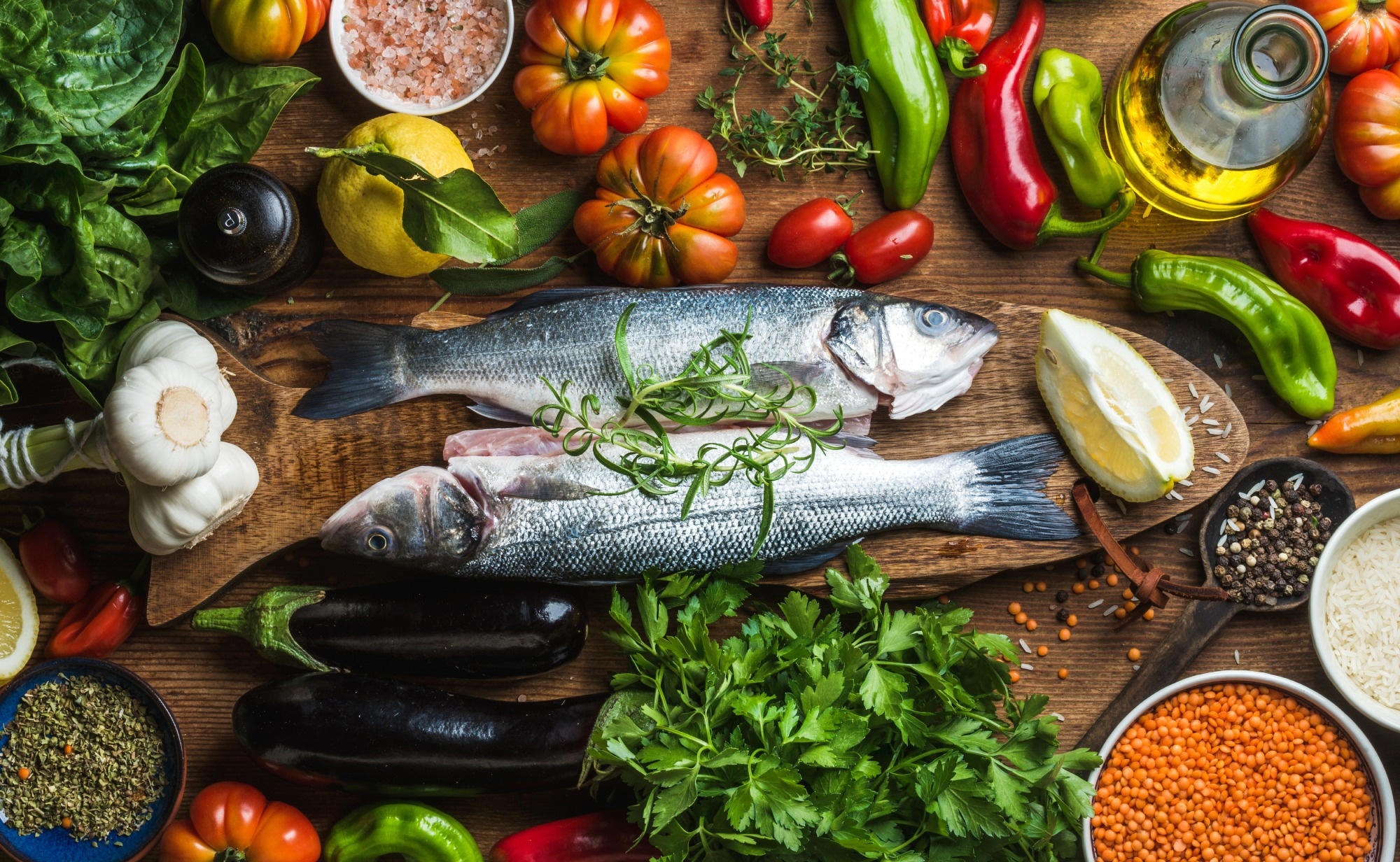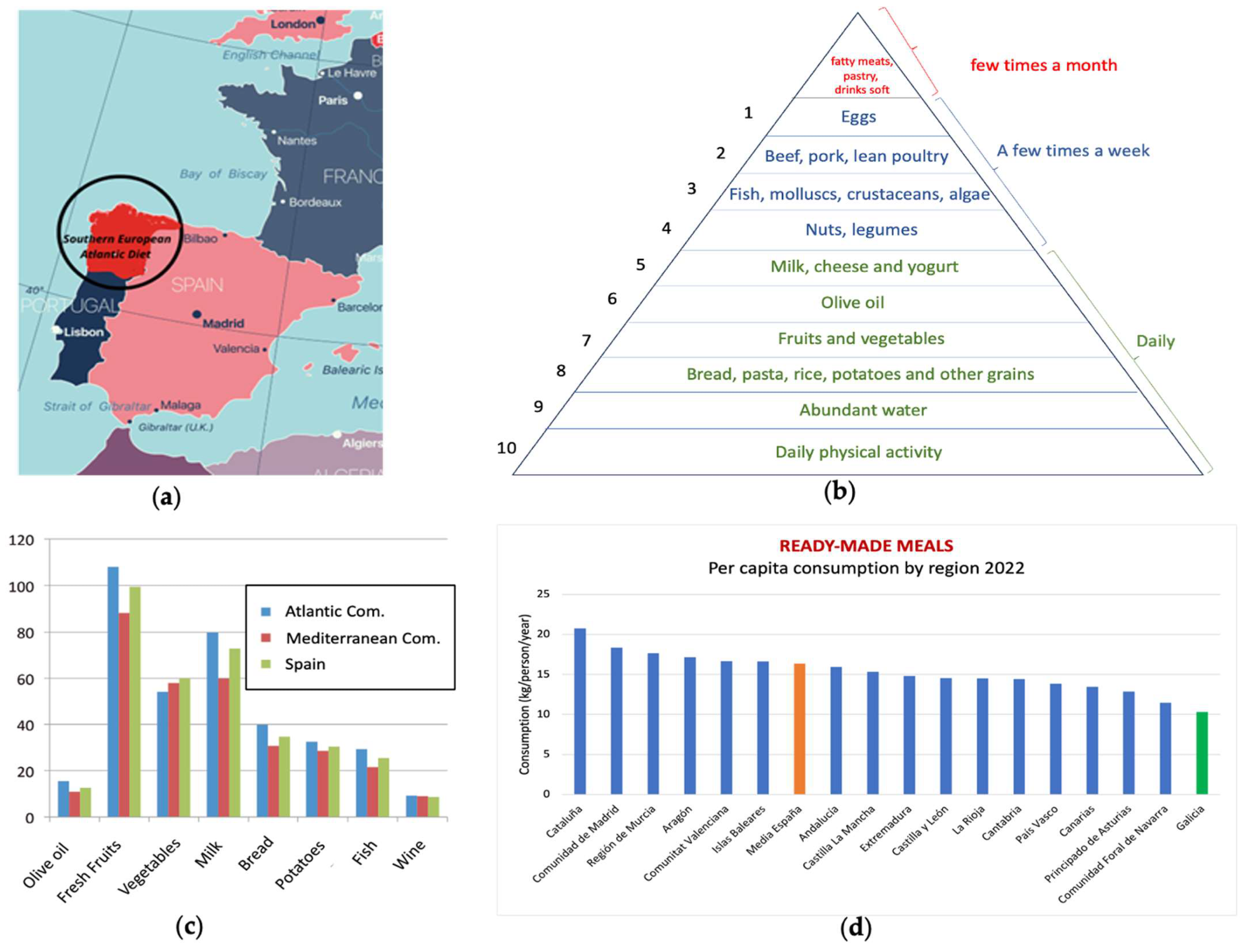Introduction
Key components of the Atlantic diet
Nutritional profile and functional food aspects
Health benefits and scientific evidence
Comparison to other traditional diets
Sustainability and cultural relevance
Implementation and global appeal
Conclusion
References
Further reading
Learn how the Atlantic diet unites tradition, science, and sustainability in a model of eating that may reshape global health.
 Image Credit: vichie81 / Shutterstock.com
Image Credit: vichie81 / Shutterstock.com
Introduction
The Southern European Atlantic Diet (SEAD), often referred to simply as the Atlantic diet, is the traditional dietary pattern originating from the culinary heritage of northern Portugal and northwestern Spain, particularly the region of Galicia. The Atlantic diet is defined by a philosophy of consuming fresh, local, seasonal, and minimally processed foods that reflect the rich agricultural and marine resources of the Iberian Atlantic coast.1, 2
Traditional dietary patterns like the Atlantic diet are gaining significant scientific interest for their potential to promote longevity and reduce the risk of adverse physiological conditions. This article provides a comprehensive, evidence-based analysis of the core components of the Atlantic diet, as well as its nutritional profile and impact on a wide range of health outcomes.3,4
 Territorial zone covered by the SEAD; (b) nutritional pyramid of the South European Atlantic Diet (c) comparative consumption of the main beneficial elements of Iberian diets and the whole of Spain (d) consumption of ready-made meals in Spain (by Regions, average of Spain in orange bar, Galicia in green bar): Source: Ministry of Agriculture, Fisheries, and Food, Government of Spain, Food consumption report of Spain, 2022.2
Territorial zone covered by the SEAD; (b) nutritional pyramid of the South European Atlantic Diet (c) comparative consumption of the main beneficial elements of Iberian diets and the whole of Spain (d) consumption of ready-made meals in Spain (by Regions, average of Spain in orange bar, Galicia in green bar): Source: Ministry of Agriculture, Fisheries, and Food, Government of Spain, Food consumption report of Spain, 2022.2
Key components of the Atlantic diet.
The Atlantic diet is characterized by the high consumption of fresh fish and shellfish, as well as an abundance of seasonal vegetables, especially Brassica varieties like cabbage and kale. Fruits, whole grains like corn and rye, as well as potatoes and legumes, are also frequently consumed as part of the Atlantic diet.2
Olive oil is the principal culinary fat used both for cooking and as a salad dressing. Dairy products, particularly milk and cheese, are consumed daily. Alcohol intake is typically moderate and most often consists of wine consumed with meals, in line with cultural traditions.1
The Atlantic diet can be considered a holistic dietary lifestyle, as meals are typically prepared using simple techniques like boiling, grilling, baking, and stewing, all of which preserve the ingredients' nutritional integrity and authentic flavors. Furthermore, anecdotal evidence suggests that substantial cultural value is placed on conviviality and family meals, which foster mindful eating habits and strengthen social and community bonds.2
Nutritional profile and functional food aspects
The physiological benefits associated with the Atlantic diet arise from a synergistic combination of nutrients and bioactive compounds. Research indicates that its nutritional profile is well-balanced, which protects individuals against the chronic inflammation and oxidative stress that underlie many non-communicable chronic diseases.2,5
The Atlantic diet encourages at least three to four servings of fish and seafood every week, which ensures an abundant supply of long-chain omega-3 fatty acids. In particular, eicosapentaenoic acid (EPA) and docosahexaenoic acid (DHA) are potent anti-inflammatory biomolecules that have a protective role in cardiovascular health.2
The emphasis on consuming a wide variety of plant-based foods results in a high intake of both soluble and insoluble fiber. Sufficient fiber intake is critical for promoting satiety, supporting regular bowel function, and maintaining metabolic homeostasis by regulating blood sugar levels and reducing low-density lipoprotein (LDL) cholesterol.2
Brassica vegetables are rich in glucosinolates, which reduce oxidative stress and exert other anti-inflammatory effects. Additionally, the daily consumption of fresh or minimally processed dairy products, including fermented products like cheese, introduces probiotics that are beneficial for maintaining a healthy and diverse gut microbiome, which is essential for proper immune function and overall health. Seaweed, increasingly incorporated into traditional Portuguese and Galician recipes, contributes unique bioactive compounds such as fucoxanthin, which may provide anticancer and metabolic health benefits.2,5
Health benefits and scientific evidence
The Galicia Atlantic Diet (GALIAT) study was a six-month randomized controlled trial involving 250 families in Galicia, NW Spain, that incorporated nutrition education, cooking classes, and curated food baskets, which led to significant health improvements in cases as compared to controls.
High diet adherence to the Atlantic Diet was associated with significant reductions in waist circumference, body weight, and LDL cholesterol levels, as well as an increase in high-density lipoprotein (HDL) cholesterol.,6 In fact, study participants in the intervention group who were free of metabolic syndrome at baseline were 68% less likely to develop the condition as compared to controls.3
A European multicohort study separately leveraged long-term observational data on about 35,917 participants over a median period of 13.6 years. Herein, higher adherence to the Atlantic diet was associated with a significantly lower risk of all-cause mortality, cardiovascular disease (CVD), and cancer-associated mortality. A complementary multicohort study of 13,297 participants found that adherence to the Atlantic diet was also linked to a 9% reduced risk of developing depression over 3.9 years of follow-up.4,7
Comparison to other traditional diets
The foundational principles of the Atlantic diet are largely consistent with those of the Mediterranean diet. However, given key differences in geographical and agricultural contexts, the Atlantic diet typically features a higher intake of fish and seafood, dairy products, potatoes, and Brassica vegetables as compared to the Mediterranean diet. Furthermore, the Mediterranean diet emphasizes legumes and limits red meat while allowing moderate dairy intake, usually as cheese or yogurt, whereas the Atlantic diet is more permissive of these foods.2
These differences establish the Atlantic diet as a distinct, though equally valid, model of healthy eating that may be more affordable and adaptable in regions where its staple foods are more accessible.6
Sustainability and cultural relevance
The emphasis on local, seasonal, and minimally processed foods inherently supports environmental sustainability by reducing food miles, carbon emissions, and promoting biodiversity. Nevertheless, the estimated carbon footprint of the Atlantic diet is about 3.0 kg of carbon dioxide (CO2) equivalents/person/day, with livestock and shellfish consumption responsible for about 70% of these emissions. This footprint is lower than many typical Western dietary patterns, but secondary analysis of the GALIAT trial found that dietary interventions did not significantly reduce carbon emissions compared with controls, suggesting that environmental benefits may depend strongly on food sourcing choices.2, 8
The high seafood content of the Atlantic diet is a key factor limiting its widespread adoption, as a significant and rapid increase in seafood consumption could strain already overfished stocks and fragile marine ecosystems. Therefore, any public health recommendations supporting the Atlantic diet must be paired with strong guidance on choosing seafood from certified sustainable sources.2,9
The Atlantic diet promotes the preservation of traditional culinary practices and the critical social role of intergenerational home-cooked meals. Incorporating these virtues into the global food system may help promote a harmonious, sustainable, and healthy future.2
Implementation and global appeal
Despite the Atlantic diet gaining recognition in public health communities as a viable and effective model for promoting health, its global adoption faces several barriers. These challenges include the cost and accessibility of fresh fish, cultural differences in meal preparation, and a lack of holistic familiarity with its core components.3,6
The success of the GALIAT trial, which used a multi-pronged intervention of education, skills training, and food provision, offers a powerful model for how widespread and long-term public health initiatives can overcome these barriers.6
Conclusions
The Atlantic diet is a rich and ancient dietary pattern that successfully combines nutritional density, environmental sustainability principles, and deep cultural integrity. Robust findings from recent clinical trials and large-scale cohort studies strongly support promoting the Atlantic diet as a valuable model for healthy eating.
However, while clear health benefits have been demonstrated, evidence on environmental impact is more nuanced: the Atlantic diet has a lower footprint than many Western diets, but interventions such as the GALIAT study did not significantly reduce carbon emissions. This suggests that sustainability outcomes will depend heavily on responsible sourcing, particularly of seafood and livestock products.
By prioritizing fresh, seasonal, and local foods, particularly fish, vegetables, and increasingly seaweeds, while simultaneously valuing the cultural importance of shared meals, individuals and communities worldwide can adapt the principles of the Atlantic diet to achieve modern health goals in a sustainable way.
References
- Rivas-Fernández, I., Roade-Pérez, P., López-Alonso, M., et al. (2025). Observance of the Atlantic Diet in a Healthy Population from Galicia (NW Spain): A Comparative Study Using a New Scale-Based Procedure to Assess Adherence. Foods, 14(15), 2614. DOI:10.3390/foods14152614., https://www.mdpi.com/2304-8158/14/15/2614
- Vivanco, P. G., Taboada, P., & Coelho, A. (2023). The Southern European Atlantic Diet and Its Supplements: The Chemical Bases of Its Anticancer Properties. Nutrients, 15(19), 4274. DOI: 10.3390/nu15194274. https://www.mdpi.com/2072-6643/15/19/4274
- Cambeses-Franco, C., Gude, F., Benítez-Estévez, A. J., González-García, S., Leis, R., Sánchez-Castro, J., Moreira, M. T., Feijoo, G., & Calvo-Malvar, M. (2024). Traditional Atlantic Diet and Its Effect on Health and the Environment. JAMA Network Open, 7(2), e2354473. DOI:10.1001/jamanetworkopen.2023.54473. https://jamanetwork.com/journals/jamanetworkopen/fullarticle/2814624
- Carballo-Casla, A., Stefler, D., Ortolá, R., Chen, Y., Knuppel, A., Ruiz, M., Kozela, M., Kubinova, R., Pajak, A., Rodríguez-Artalejo, F., Brunner, E. J., & Bobak, M. (2023). The Southern European Atlantic diet and depression risk: a European multicohort study. Molecular Psychiatry, 28(8), 3475–3483. DOI:10.1038/s41380-023-02125-9. https://www.nature.com/articles/s41380-023-02125-9
- Mendes, M. L., Pires, A., Gonçalves, A., Pires, C., Lourenço, H. M., Saraiva, A., Zandonadi, R. P., Ramos, F., & Raposo, A. (2025). Do Seaweeds Contribute to Nutritional Composition and Acceptance in Traditional Portuguese Recipes? Foods, 14(11), 1947. DOI:10.3390/foods14111947, https://www.mdpi.com/2304-8158/14/11/1947
- Calvo-Malvar, M., Benítez-Estévez, A. J., Sánchez-Castro, J., Leis, R., & Gude, F. (2021). Effects of a Community-Based Behavioral Intervention with a Traditional Atlantic Diet on Cardiometabolic Risk Markers: A Cluster Randomized Controlled Trial ("The GALIAT Study"). Nutrients, 13(4), 1211. DOI:10.3390/nu13041211, https://www.mdpi.com/2072-6643/13/4/1211
- Carballo-Casla, A., Stefler, D., Ortolá, R., Chen, Y., Knuppel, A., Kubinova, R., Pajak, A., Rodríguez-Artalejo, F., Brunner, E. J., & Bobak, M. (2023). The Southern European Atlantic diet and all-cause and cause-specific mortality: a European multicohort study. European Journal of Preventive Cardiology, 31(3), 358–367. DOI:10.1093/eurjpc/zwad370, https://academic.oup.com/eurjpc/article/31/3/358/7475370?login=false
- Esteve-Llorens, X., Darriba, C., Moreira, M. T., Feijoo, G., & González-García, S. (2019). Towards an environmentally sustainable and healthy Atlantic dietary pattern: Life cycle carbon footprint and nutritional quality. Science of The Total Environment, 646, 704–715. DOI:10.1016/j.scitotenv.2018.07.264. https://www.sciencedirect.com/science/article/abs/pii/S0048969718327578
- World Wildlife Fund. (n.d.). Sustainable Seafood. https://www.worldwildlife.org/industries/sustainable-seafood. Accessed on 11th August 2025.
Further Reading
Last Updated: Aug 17, 2025